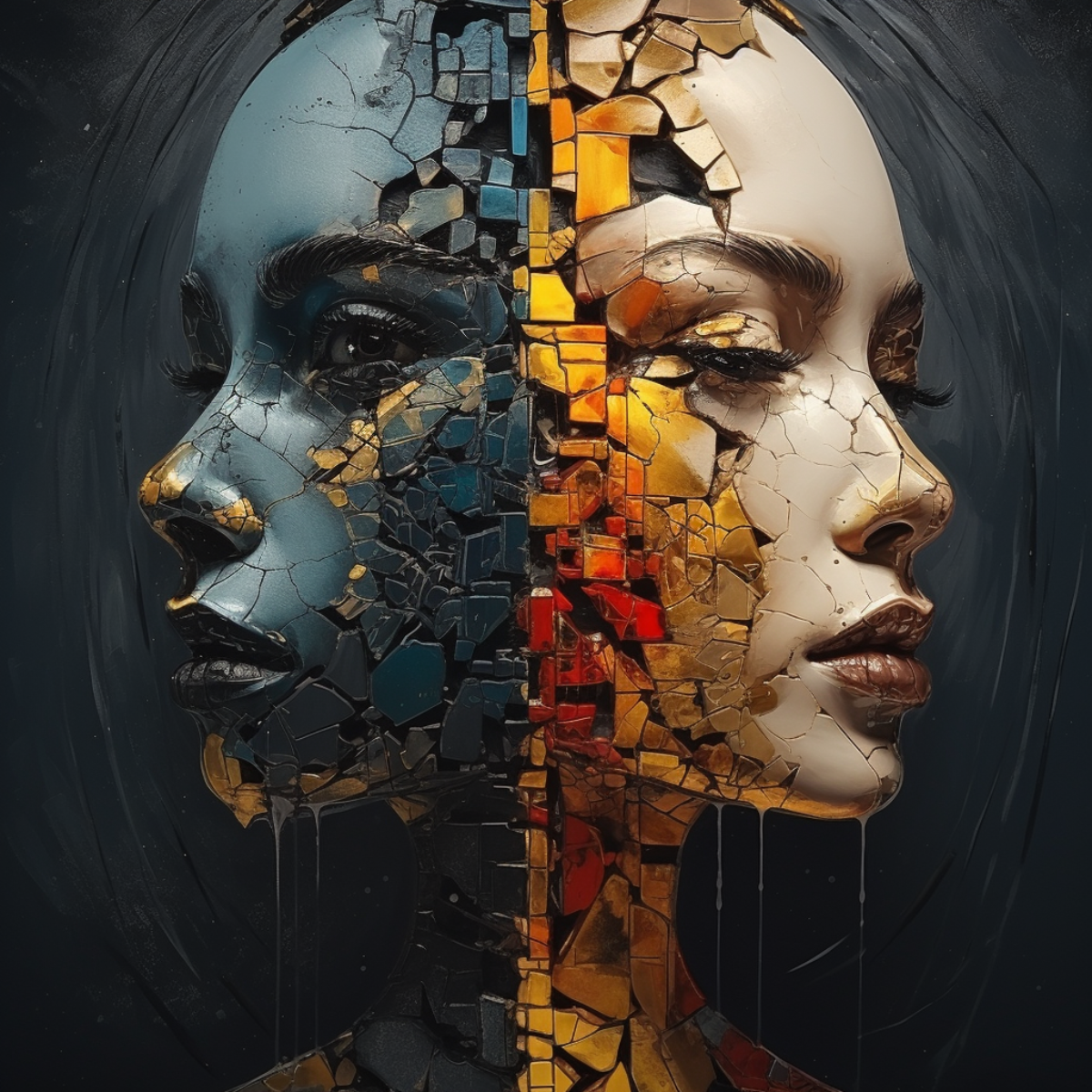
Kissing the Dark: Unmasking the Badassery of Your Shadow Self
Welcome back, spunky soul! Navigating the maze of your persona didn’t throw you for a loop? I’m impressed. You got moxie!
So, if you think you’ve got the chops for the next act of this soul-searching spectacle, dress to the nines and pucker up. It’s time to meet your shadow and plant a big, fat kiss on its lips.
Meet Your Shadow: The Unsung Hero (or Villain) of Your Psyche
Your shadow is that subconscious bit of you that you’d rather not showcase on your Insta feed. You’re probably thinking, “Can’t I just swipe left on this shadow business?” Nope. Your shadow is like the spam emails offering you a lifetime supply of Viagra—persistent, embarrassing, and impossible to unsubscribe from.
Here is a glimpse of what your shadow holds:
- Fears: These aren’t just your run-of-the-mill fears like spiders or heights. We’re talking about deep-rooted fears that can dictate your life choices, such as the fear of rejection or the fear of not being good enough.
- Suppressed Emotions: Ever feel a twinge of jealousy but squash it down because “good people don’t get jealous”? Those squashed feelings are a part of your shadow. Instead of stuffing them into an emotional suitcase, give them a pat on the back and tell them they’re a part of you too.
- Past Traumas: These are the emotional scars that we prefer to lock away and not think about. Ignored or not, they can influence our reactions and decisions in unexpected ways. A parent’s constant disapproval could lead you to seek perfection in adulthood, driven by a shadow fear of not being ‘good’ enough.
- Untapped Creativity: Believe it or not, your shadow may hold artistic or inventive potentials that you’ve suppressed because they didn’t fit into your ‘acceptable’ self-image. Perhaps you loved painting as a child, but gave it up because it wasn’t considered a ‘practical skill.’ That creative flair now resides in your shadow, waiting to add color to your life.
- Hidden Capabilities: These could be talents or skills that you’ve hidden away because they were labeled as ‘impractical’ or ‘unimportant. you might have a knack for public speaking, but because of a fear of judgment, you’ve kept this talent hidden.
Yep, it’s a mixed bag—and you can’t just mute or block it. Now, let’s unpack how this Rubik’s Cube is put together.

The mysterious layers of the self, where the unknown meets the known and shadows come to life.
The Making of the Shadow
Growing up, you’re taught to adopt certain behaviors and avoid others. You become this curated version of yourself, learning what’s ‘acceptable’ and what should be hidden. It’s like creating a playlist of your favorite hits, except you’ve left out all the guilty pleasures – you know, the songs you shamelessly sing in the shower like Friday and Baby Got Back. You gotta admit Sir Mix-A-Lot was way ahead of his time. Anyway, here’s how the shadow is made:
- Early Childhood: From your first taste of societal norms—probably a scolding from an adult—you begin to learn the ‘dos’ and ‘don’ts’ of life.
- Social Pressure: Peer pressure, expectations from family, and societal norms continue to shape your behavior.
- Rejection and Shame: Traits and feelings that evoke shame or discomfort get stashed away in your shadow.
- Adulthood: Your shadow solidifies as you grow, gathering more complexity but also more emotional wisdom if you dare to delve into it.
Alright, let’s unpack this a bit. The development of your shadow isn’t some random event and it’s nothing to be ashamed about. Everyone’s got them. It’s a well-scripted drama with distinct acts, guided by different external and internal influences at each life stage.
Think of it this way: your public persona is like your playlist of top hits you proudly share with the world. But those hidden gems you rap along to during solo car rides, that’s your shadow. And that part of you deserves some loving, too.
Gettin’ Jiggy with Your Shadow
Picture this: You’ve just nailed the quarterly meeting and dropped the mic in corporate style—PowerPoint slides and all. Now you’re in your car, rapping along with Cardi B like a Queen. Inside those four walls of your car, you go from zero to Cardi, real quick. That’s your shadow: the side of you that only your car’s upholstery gets to judge.
The shadow is the ‘junk’ drawer you keep at home, a collection that grows over time. In early childhood, the drawer might contain simple trinkets—things you’re told are ‘childish’ or ‘unimportant.’
Come adolescence, it gets filled with societal taboos influenced by peer pressure and social media. By adulthood, it’s a varied mix of professional expectations, personal relationships, and other complexities—out of sight, but always there.
It’s where you stash the old lottery tickets that once sparkled with dreams of a jackpot but are now just crumbled aspirations. And let’s not forget the stockpile of adorable crayon scribbles your kiddo gave you; to the world, they might look like ‘toddler graffiti,’ but to you, they’re priceless works of art!
These hidden treasures symbolize those fabulous traits that you keep under wraps because you think they’re not ‘the norm.’ But guess what? Those are often the most vibrant, intriguing parts of you. The pieces of your personality that may not get the societal thumbs-up but are actually the coolest bits that make you irresistible. But here’s the catch—while it’s tempting to keep these hidden treasures tucked away, the reality is far more complex.
Turns Out, You Can’t Cancel Your Shadow
In today’s cancel culture, we’re all about nixing things that make us cringe. Bad vibes? Cancelled. Toxic friends? Blocked. But try as you might, your shadow isn’t something you can swipe left on. No, siree. You could more easily cancel your guilty pleasure for binge-watching reality TV.
Imagine if Darth Vader tried to ‘cancel’ his darker tendencies. There’d be no redemption arc, and let’s be real, Star Wars would lose some serious plot depth.
Now, picture Vader—lightsaber retired—reclining in a meadow of daffodils, contemplating his life choices. That’s your “dark side,” just waiting for you to accept it like an overdue friend request.
So, how does one befriend this inner badass? Before you reach for the sage or that dusty journal, let’s discuss the tools of shadow work.
What You’ll Need to Navigate Your Inner World
When we talk about shadow work, we often conjure images of mystical rituals, introspective journaling, dream interpretation, or artistic creation. It’s not all sage-burning and journaling until your hand cramps, folks. But hey, if you’re into that, no judgment here!
Now, let’s dive into the nitty-gritty, shall we? Behold, the Swiss Army knife of shadow work tools:
Mystical Rituals: Engaging in rituals, whether it’s meditation, mindfulness, or moon dancing naked in your backyard (Hey, I don’t judge!), can help you connect with your inner self and gain insight into the darker corners of your personality.
Introspective Journaling: Journaling is like having a one-on-one chat with your own personal life coach, except you’re both the coach and the coachee. Plus, no hourly rates! It’s the ideal place to spill the beans on all your hidden quirks and hang-ups.
Dream Interpretation: Dreams often contain symbolism that reflects our unconscious thoughts and feelings. Think of it as your nightly feature film, directed by your subconscious. Sometimes it’s a thriller, other times it’s a raunchy comedy. Either way, it’s full of hidden easter eggs about yourself.
Artistic Creation: Expressing yourself through art, whether it’s painting, writing, music, or any other creative outlet, can be a powerful way to bring your shadow into the light and process complex emotions. And also create some amazing shit. Whether it’s a masterpiece or just a mess, it’s all good as long as it helps you face your shadow. Self-portraits are a great place to start.
While these traditional practices have their worth, I’ve found that some of my most transformative shadow work has occurred in the most unexpected of places. Take for instance a grocery store parking lot.
The Transformative Power of Everyday Moments
Don’t get me wrong—I’ve had my share of eye-opening experiences while journaling, interpreting dreams, painting, or diving into the Jungian archetypes.
These activities serve as a canvas where I could project, confront, and integrate aspects of my shadow. But, something surprising unfolded in the ordinariness of daily life; moments so simple yet so profound that they eclipsed some of the structured shadow work I had been doing. You can read about how it happened here.
Important: When shadow work gets messy, seek professional guidance!
As we venture into these uncharted territories of our mind, it’s essential to stress that some shadows are darker and more complex than others. For deeper traumas or persistent issues, professional help—like psychologists or certified counselors trained in Jungian psychology—can offer valuable support. This isn’t a journey you have to, or should, go on alone.
Thoughts and emotions are woven together in a tapestry of expression.
The Mirror Effect: Seeing Your Shadow in Others
So you’ve met your shadow, right? Peeked into that ‘junk’ drawer of hidden quirks, fears, and talents? Well, now let’s talk about what happens when you start seeing your own ‘junk’ in other people’s drawers. No, not like that. Get your mind out of the gutter—we’re still talking psychology here.
Next up is a thought-provoking exploration of the existential puzzle known as projection, and believe me, this is no laughing matter. Projection could very well hold profound implications for us all. To stay in the loop and be among the first to read it, make sure to follow me on Medium.
Before you bolt, if you’re feeling brave, consider sharing your encounters with your shadow in the comments. I’d love to hear about it.




